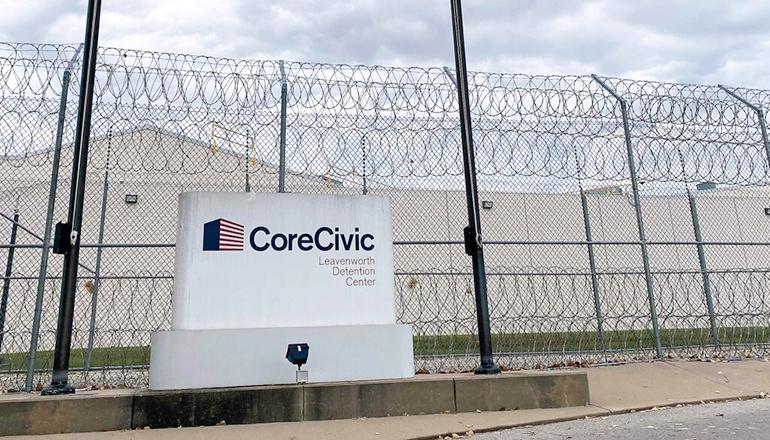(Missouri Independent) – Leavenworth County officials voted unanimously Wednesday to halt discussions over whether to convert a former private federal jail into a detention center for immigration enforcement.
For years, CoreCivic, the nation’s largest private prison operator, ran a federal pretrial detention center in Leavenworth for individuals charged with — but not convicted of — federal crimes from Kansas, Nebraska, Iowa, and western Missouri. It closed at the end of 2021 under an executive order banning the renewal of federal contracts with private prisons.
County officials have been approached several times over the last two years about converting the facility to hold detainees of U.S. Immigration and Customs Enforcement, or ICE. The county would potentially act as an intermediary between the company and the federal agency.
But members voted Wednesday to “immediately stop negotiations” with CoreCivic and ICE about serving as a party to an agreement between the company and federal agency.
It’s not clear that the county’s participation would be necessary under federal rules.
The vote comes after two years of speculation about the future of the CoreCivic facility, called the Leavenworth Detention Center. ICE told KCUR in 2021 it was not pursuing a contract for the Leavenworth facility.
CoreCivic said earlier this month that the federal agency was in the midst of procuring space for detainees in the Midwest but declined to comment further on an active contracting process.
On Wednesday, the company’s spokesman, Ryan Gustin, said in an email that CoreCivic would “continue to have an open dialogue with Leavenworth County commissioners and the City of Leavenworth to address any concerns that they might have regarding this opportunity.”
The vote came after the city expressed opposition to county officials.
Opposition to the idea of CoreCivic becoming an ICE facility ran the spectrum from anti-immigration sentiments about releasing “illegal aliens” into the community to immigration attorneys and civil rights advocates’ concerns about the facility’s history of violence and safety issues.
When CoreCivic’s Leavenworth facility held pretrial detainees under a contract with the U.S. Marshals Service, the private jail struggled with staffing crises, rampant drug use and persistent violence. It’s being sued by a former inmate whose lawsuit includes allegations of at least 10 stabbings in 2021 and two deaths by suicide.
In 2019, CoreCivic settled with 500 detainees for $1.45 million for illegally recording phone calls with their defense attorneys and providing them to prosecutors.
The facility closed at the end of 2021 when CoreCivic’s contract with the U.S. Marshals Service expired. President Joe Biden, in his first week in office, signed an executive order barring the Department of Justice from renewing contracts with private criminal detention facilities.
But ICE falls under the U.S. Department of Homeland Security.
The American Civil Liberties Union of Kansas said in a statement that it was glad the commission realized allowing CoreCivic to house ICE detainees “would be an unsafe, inhumane decision.”
“Kansans and the Leavenworth community expect better than allowing a company to continue operations in this state,” the organization said, “after CoreCivic has maintained a long and proven track record of flagrant human and civil rights violations of the people in its custody.”
(Photo by Allison Kite – Missouri Independent).


